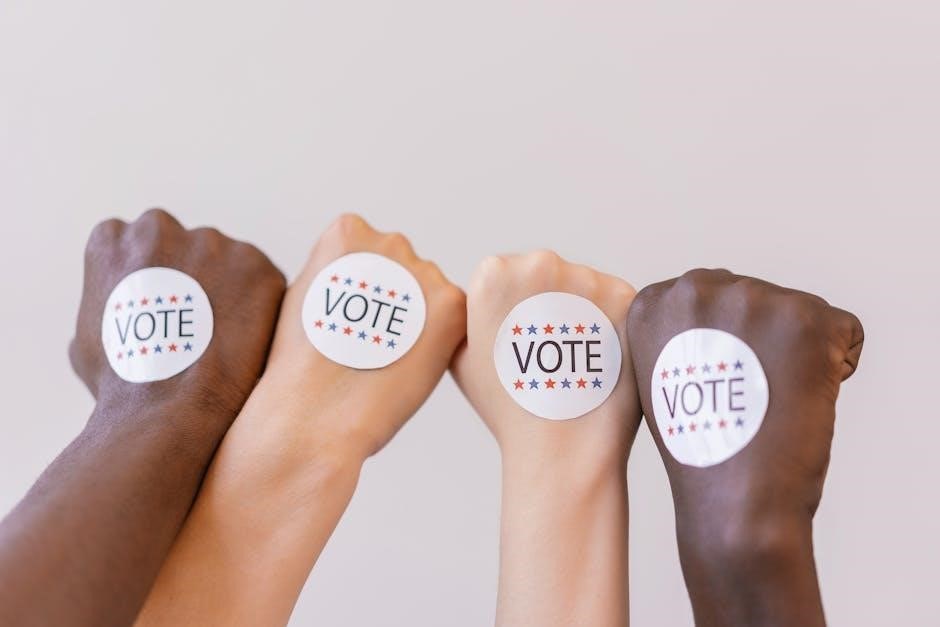iCivics’ Voting Rights Curriculum offers an interactive approach to teaching students about voting rights, empowering them with knowledge on civic responsibilities and democratic participation․
1․1 Overview of the iCivics Platform and Its Role in Civic Education
The iCivics platform is a renowned online resource designed to promote civic education through interactive games, lesson plans, and educational activities․ Founded by Justice Sandra Day O’Connor, it aims to empower teachers and students with tools to understand civics, governance, and constitutional principles․ The platform offers a variety of engaging resources, including virtual simulations and multimedia content, to make learning immersive and accessible․ By integrating real-world scenarios and historical context, iCivics helps students develop critical thinking skills and a deeper understanding of democratic processes․ Its comprehensive approach aligns with educational standards, making it a trusted resource for classrooms nationwide․ Through its innovative design, iCivics fosters civic literacy and prepares future generations to actively participate in democracy․
1․2 Importance of Voting Rights in Civic Education
Voting rights are a cornerstone of civic education, ensuring students understand the power of their voice in shaping democracy․ By studying voting rights, students gain insight into the historical struggles and legal frameworks that define American democracy․ This knowledge fosters empathy and appreciation for the sacrifices made to achieve universal suffrage․ Civic education emphasizes the responsibility of citizens to participate in elections, highlighting how informed voting impacts policies and societal progress․ Through iCivics, students engage with interactive tools that simulate voting scenarios, reinforcing the importance of civic duty․ By teaching voting rights, educators empower students to become informed, active participants in maintaining and advancing democratic principles․ This foundational knowledge is essential for fostering a civically engaged and responsible citizenry․

Historical Background of Voting Rights in the United States
Voting rights in the U․S․ evolved from exclusionary practices to broader inclusion through landmark legislation like the Civil War Amendments and the Voting Rights Act of 1965․
2․1 The Founding Era and Limitations on Voting Rights
During the Founding Era, voting rights in the United States were highly restrictive․ Initially, only white male landowners could vote, excluding women, enslaved individuals, and those without property․ The Founding Fathers debated suffrage expansion but upheld these limitations to maintain political stability․ This exclusivity reflected the social and economic hierarchies of the time․ The Three-Fifths Compromise further entrenched inequality by linking voting power to slavery․ These early restrictions set the stage for centuries of struggle to achieve universal suffrage, highlighting the tension between democratic ideals and systemic exclusion․ Understanding this history is crucial for grasping the ongoing fight for voting rights in America․
2․2 The Civil War Amendments and Their Impact on Voting Rights
The Civil War Amendments—13th, 14th, and 15th—transformed voting rights, abolishing slavery and expanding suffrage․ The 13th Amendment ended slavery, while the 14th granted citizenship to African Americans and ensured equal protection under the law․ The 15th Amendment prohibited denying voting rights based on race, color, or previous servitude․ These amendments aimed to establish equality but faced resistance through Jim Crow laws․ Despite challenges, they laid the groundwork for future civil rights advancements, emphasizing the federal government’s role in protecting individual rights․ This era marked significant progress toward inclusive democracy, though full realization of voting rights remained an ongoing struggle․

2․3 The Civil Rights Movement and the Fight for Equal Voting Rights
The Civil Rights Movement of the 1950s and ’60s was pivotal in securing equal voting rights․ Activists faced systemic racism, literacy tests, and poll taxes that disenfranchised African Americans․ Key events like the Selma to Montgomery Marches highlighted voting discrimination, leading to the landmark Voting Rights Act of 1965․ This legislation prohibited racial discrimination in voting and authorized federal oversight of elections in states with a history of voter suppression․ The movement also saw the emergence of powerful leaders and organizations advocating for suffrage, ensuring that marginalized communities could participate in democracy․ These efforts continue to inspire modern fights against voter suppression and gerrymandering, emphasizing the enduring importance of equal access to the ballot box․
Key Legislation Governing Voting Rights
The Voting Rights Act of 1965, 14th and 15th Amendments, and other laws ensure equal voting rights, preventing discrimination and safeguarding citizens’ ability to participate in elections․

3․1 The Voting Rights Act of 1965
The Voting Rights Act of 1965 was landmark legislation passed during the Civil Rights Movement to eliminate racial discrimination in voting․ It prohibited literacy tests, poll taxes, and other barriers that had historically disenfranchised minority voters․ The law also mandated federal oversight of elections in states with a history of discrimination, ensuring compliance with its provisions․ By addressing systemic inequalities, the Act significantly increased voter registration and participation among African Americans and other marginalized groups․ It remains a cornerstone of voting rights protections and has been amended several times to maintain its relevance and effectiveness in safeguarding citizens’ access to the ballot box․
3․2 The 14th and 15th Amendments to the U․S․ Constitution
The 14th Amendment, ratified in 1868, defined citizenship and ensured equal protection under the law, laying the groundwork for voting rights․ The 15th Amendment, ratified in 1870, explicitly protected the right to vote regardless of race, color, or previous servitude․ Together, these amendments aimed to address systemic inequalities and expand suffrage․ The 14th Amendment’s Section 1 prohibited states from denying anyone life, liberty, or property without due process, while the 15th Amendment directly targeted racial discrimination in voting․ These amendments were pivotal in shaping the legal framework for voting rights, though their full implementation required further legislation and activism․ iCivics resources highlight their significance in civic education, emphasizing their enduring impact on equality and democracy․
3․3 Other Relevant Laws and Supreme Court Cases
Beyond the 14th and 15th Amendments, other laws and court decisions have shaped voting rights․ The Voting Rights Act of 1965, while covered earlier, is complemented by the 24th Amendment, which prohibits poll taxes․ The Uniformed and Overseas Citizens Absentee Voting Act ensures military and overseas voters can participate․ Supreme Court cases like Shelby County v․ Holder (2013) have impacted enforcement of voting protections․ Recent cases, such as Moore v․ Harper (2023), address electoral map-making and voting rights․ These laws and rulings highlight the ongoing evolution of voting rights, balancing equality and state autonomy․ iCivics resources explore these complexities, helping students understand the dynamic nature of civic participation and the legal framework protecting it․ Such cases underscore the importance of staying informed about changes in voting rights legislation and jurisprudence․
The iCivics Answer Key PDF: Structure and Content

The iCivics Answer Key PDF is structured to align with its educational games and activities, offering clear answers and explanations on voting rights, ensuring student understanding and engagement․
4․1 Understanding the Format of the Answer Key

The iCivics Answer Key PDF is designed to provide clarity and ease of use for educators and students․ It typically follows a structured format, with answers organized by lesson or activity․ Each question is numbered and paired with a concise, accurate response․ The key often includes explanations to ensure understanding of complex concepts․ It aligns with iCivics’ interactive games and activities, reinforcing learning objectives․ The format may also feature additional resources or teaching tips․ This structure helps educators assess student progress and reinforce civic education principles effectively․ The answer key is a valuable tool for integrating iCivics’ curriculum into classroom instruction seamlessly․
4․2 Key Questions and Answers on Voting Rights
The iCivics Answer Key PDF addresses fundamental questions about voting rights, ensuring a comprehensive understanding․ It covers historical milestones, such as the 15th Amendment and the Voting Rights Act of 1965, explaining their significance․ Questions explore who has the right to vote, barriers to voting, and the impact of laws like gerrymandering․ Answers are detailed, providing context and real-world examples, such as the Civil Rights Movement’s role in expanding voting rights․ The key also addresses contemporary issues, like voter suppression and Supreme Court decisions․ By focusing on these critical areas, the PDF equips students with essential knowledge about the evolution and current state of voting rights in the U․S․
4․3 How the Answer Key Aligns with iCivics Games and Activities
The iCivics Answer Key PDF seamlessly integrates with iCivics’ interactive games and activities, reinforcing learning through engaging content․ Games like “Win the White House” and “Lawcraft” simulate real-world civic scenarios, while the answer key provides structured responses to related questions․ This alignment ensures students can apply theoretical knowledge to practical exercises, enhancing their understanding of voting rights; For instance, activities exploring gerrymandering and voter suppression are supported by key questions in the PDF, fostering a deeper grasp of these issues․ By combining interactive gameplay with guided answers, iCivics creates a comprehensive educational experience that prepares students for informed civic engagement․ This dual approach makes complex topics accessible and engaging for learners of all levels․

Modern Challenges to Voting Rights
Modern challenges include voter suppression, gerrymandering, and restrictive voting laws, which limit electoral representation and intimidate voters, undermining the integrity of democratic processes nationwide․
5․1 Voter Suppression and Its Implications
Voter suppression refers to tactics that restrict eligible voters’ ability to participate in elections, often targeting marginalized communities․ Common methods include strict voter ID laws, voter roll purges, and limited access to polling places․ These practices disproportionately affect minorities, low-income individuals, and the elderly, undermining democratic representation․ The implications are profound, as suppressed votes can alter election outcomes and erode trust in the electoral system․ Legal challenges and advocacy efforts continue to address these issues, but the persistence of voter suppression remains a significant barrier to equal voting rights․ Educating citizens about these tactics is crucial to combating their impact and ensuring fair electoral processes․
5․2 Gerrymandering and Its Impact on Electoral Representation
Gerrymandering involves manipulating electoral district boundaries to favor a political party or group, often diluting the voting power of marginalized communities․ This practice can lead to Misrepresentation in government, as districts are drawn to ensure one party maintains control, regardless of the popular vote․ Gerrymandering disproportionately affects minority voters, making their votes less influential․ Legal challenges frequently arise, with courts sometimes ruling such district maps as unconstitutional․ The impact extends to polarized politics and reduced voter turnout, as citizens feel their votes do not matter․ Addressing gerrymandering requires fair redistricting practices to ensure equitable representation and uphold democratic integrity․

5․3 The Role of the Supreme Court in Shaping Voting Rights
The Supreme Court has played a pivotal role in shaping voting rights through landmark decisions that interpret constitutional amendments and federal laws․ Cases such as Shelby County v․ Holder have significantly impacted voter protections, rolling back key provisions of the Voting Rights Act․ The Court’s rulings influence voter ID laws, gerrymandering, and ballot access, often sparking debates over equal representation․ Its decisions can either expand or restrict voting rights, affecting marginalized communities․ The judiciary’s involvement underscores the ongoing struggle to ensure equitable access to the ballot box, reflecting broader societal tensions around race and political power․ The Court’s interpretations continue to define the landscape of American democracy and voter equality․
Education and civic engagement are crucial for protecting voting rights, ensuring equality, and fostering a just democracy․
6․1 The Importance of Education in Protecting Voting Rights
Educating students about voting rights is essential for fostering informed citizens and safeguarding democracy․ iCivics’ curriculum provides interactive tools, such as the Voting Rights Answer Key PDF, to enhance understanding of legal frameworks and historical struggles․ By engaging students in simulations and real-world scenarios, the curriculum bridges theoretical knowledge with practical application․ This approach not only raises awareness of voter suppression and gerrymandering but also encourages critical thinking about social justice․ Empowering future voters through education ensures they can advocate for their rights and participate meaningfully in civic processes․ Consequently, educated citizens are better equipped to address modern challenges and uphold democratic values․
6․2 Encouraging Civic Engagement and Participation
Encouraging civic engagement is vital for fostering active citizenship and ensuring the vitality of democracy․ The iCivics Voting Rights Curriculum, supported by resources like the Voting Rights Answer Key PDF, equips students with the knowledge and skills to participate meaningfully in civic life․ Through interactive games, simulations, and real-world applications, students gain hands-on experience with democratic processes․ This engagement not only builds confidence but also instills a sense of responsibility to advocate for their rights and the rights of others․ By fostering critical thinking and analytical skills, the curriculum empowers students to navigate complex civic challenges and contribute to a more inclusive and equitable society․ Ultimately, educated and engaged citizens are the cornerstone of a thriving democracy․
6․3 The Future of Voting Rights in the United States
The future of voting rights in the U․S․ hinges on addressing ongoing challenges like voter suppression, gerrymandering, and unequal access to polling resources․ Advocacy for legal reforms, such as automatic voter registration and mail-in voting, is crucial to expanding participation․ Technology will play a pivotal role in modernizing the electoral process, ensuring security and accessibility․ Education, particularly through programs like iCivics, is essential to fostering an informed electorate capable of advocating for their rights․ By equipping students with knowledge of voting rights and civic responsibilities, these initiatives empower future generations to protect democracy․ The collective efforts of policymakers, educators, and citizens will shape a more inclusive and equitable voting system;
